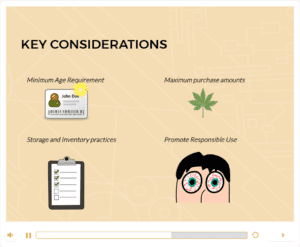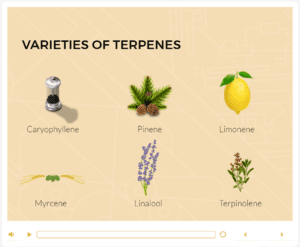Cannabis Education Business Problem
A rapidly changing legal landscape resulting in immense growth in the Cannabis industry created an education and skills gap that needed to be filled. This Cannabis education needs to be applied to the entire industry and numerous sectors within the industry. To effectively train nationwide, providing consistent, auditable, and accurate information, elearning Cannabis education programs was an ideal solution.
Cannabis Compliance Inc. (CCI) is Canada’s oldest cannabis consulting company (recently acquired by Deloitte Canada). They saw an opportunity to develop compliance training for their existing clients to help them transition from the medical marijuana-governed regime. The legalization of cannabis meant new retail infrastructure, distribution rules, licensing rules, and a transition to a new legal framework for growers. Comprehensive Cannabis education was required to assist retail vendors in meeting legal requirements and maximizing sales.
Spark + Co. was engaged by CCI to design and create online programs to train front-line customer service staff in the retail cannabis marketplace.
Training Program Constraints
As CCI needed to develop Cannabis education while regulations were still being drafted, this created several constraints.
The first constraint was determining what would actually be in the Cannabis education programs. It’s hard to decide on the course length, the instructional activities, or how long it would take to develop that course when some of the specific content is still unknown. However, we compiled research and best practices and drafted initial content for the Cannabis programs for internal experts to review.
A second constraint was the limited availability of internal subject matter experts on Cannabis education to contribute to the course development. The demand for their expertise was extraordinary, but using online review techniques, their feedback and insight allowed us to create comprehensive programs on Cannabis education for retail outlets.
A third constraint was that CCI had selected an LMS (learning management system), but it was not currently operational. We had to get up to speed on the inner workings of the LMS since every LMS influences the overall course structure and experience. As this was a training product to be sold by CCI, we also needed to pay close attention to the user experience to keep future support costs down to maximize profitability for the Cannabis education programs.

Screenshot of Cannabis Education for the Retail Consultant Program
Cannabis Education Programs Design Process
In creating these courses, we used our typical four-stage process.
Engage + Analyze
As with all our projects, in collaboration with CCI, we established guiding principles to help meet the project goals within the constraints. For example, “What were the trade-offs we could and couldn’t make?” and “What would govern our decisions for creating Cannabis education?”
The project could be delivered on time, meeting CCI’s objectives. At the same time, value-added features could be included in a later release. We ascertained that the timeline was critical and the information had to be precise, ensuring correct interpretation and application of the regulations within the legal framework. We also created a list of non-critical enhancements to the Cannabis education courses that could be made after the initial launch.
Learning objectives for each program were also established, ensuring that the approach focused on applying the new knowledge acquired by the retailers taking the Cannabis education.
The retail programs aimed to provide comprehensive and efficient training to staff who require basic knowledge of cannabis, its effects, standard operating procedures, and the regulations within the Cannabis Act they must adhere to.
Instructional + Creative Design
A challenge with compliance-oriented courses can be the amount of legalese and do’s + don’ts they contain. While the legal content of the Cannabis education was compliance-based, we placed a significant focus on creating engaging instructional activities.
The learner needed to understand why learning the information in the course was essential. It couldn’t just be because they “had” to – a typical challenge with compliance-oriented courses. They had to see the importance of their work in the grand scheme of the new legalization and maximizing the profitability of their retail business. For example, many scenarios were included that showed the potential consequences and personal impact on customers of not following procedures and regulations rather than solely focusing on the punitive effects of the legislation.
A Storyboard was created that included
- sequence of content,
- narrative writing of the story,
- topics and story arc, and
- activities for each topic to ensure all the learning objectives were covered.
Build, Test + Modify
The subject matter experts identified topic areas and wrote the content in each of the identified areas, such as standard operating procedures for retail distribution. A series of modules were outlined along with associated learning activities and content.
As further information became available, the structure of the outlined modules needed to change. Some Cannabis education topics were condensed, others expanded and elaborated upon, and a narrative approach was created that followed a new employee through their learning journey.
Although the Act was Federal, each Province was responsible for creating its own regulations. So rather than creating completely separate Cannabis education programs for each Province, we focused on the common areas across all Provincial regulations and noted exceptions as they occurred. For example, the legal age of consumption was consistent across all provinces except Alberta and Quebec. In cases where more substantive differences existed, links to specific information on the respective provincial regulations were created.
As the project progressed, 3 versions were created, reviewed, and modified following feedback from CCI and subject matter experts before the next version was produced.
Launch
The Retail Consultant online course was successfully delivered and launched on time as the first of the Cannabis education programs. As part of the launch, Spark + Co. worked with CCI to develop a video highlighting the breadth of information covered, the interactivity, and the applied nature of the course. We supported creating a promotional video sharing screenshots and video excerpts of the course. This assisted CCI in their marketing and sales of the Cannabis education course.
Cannabis Education Training Solution
The elearning course was developed in Articulate Storyline and included 4 modules.
- Customer Service
- Store Operations
- Product Knowledge
- Effects of Cannabis
As a self-paced course, it allows individuals to prepare themselves to work in the retail Cannabis industry. It enables companies to invest in training for their employees without the added cost of developing it themselves.
Outcome
CCI established a strong position in the marketplace, building on its first-mover advantage in the space. After receiving approval from Health Canada for the course, they have been able to market and sell the online Cannabis education program to their clients.
“Spark and Co was a lifesaver. They stepped in at the last minute when it seemed as though we weren’t going to be able to complete our curriculum on time. Holly and her team provided guidance and offered out of the box solutions that not only delivered our project on time, but provided us with a product that we are proud of. Their expertise, professionalism and general know-how was a breath of fresh air.”
Shannon Kloet – Director of Training – CANNABIS COMPLIANCE INC.
CCI established custom training programs for their clients and expanded their curriculum and the courses provided. It generated strong revenue growth for CCI and contributed to its acquisition by Deloitte.
During this initial engagement and as a result of the partnership’s success, CCI engaged Spark + Co. to develop five additional custom Cannabis education programs with a total of 13 courses. Each of these additional programs was much larger and more technical than the initial Retail Consultant course. Yet, all the courses had the same deadline and were completed on time and budget.
The additional five Cannabis education programs created were
- Quality Assurance Associate (4 online courses)
- Production Associate (3 online courses)
- Production Manager (4 online courses)
- Master Grower (1 online course)
- Integrated Pest Management (1 online course)






